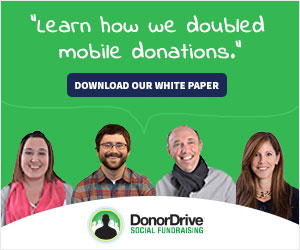
Many factors erode effective listening in nonprofit environments. Go ahead and list them: workload, multi-tasking, sharing office space with others, and lacking time for the kind of listening appropriate for our most important constituents.
However, in the real world of nonprofits, listening to donors and those we serve is critical for fundraising, strategic planning, and adapting our missions to meet current priorities.
“In business, companies often receive a prompt wake-up call when they don’t listen to their customers—sales and profits, the universal measures of success, generally decline,” says the Stanford Social Innovation Review.
“In the social sector, however, we may not get timely notice if we ignore our beneficiaries,” notes the SSIR in “Listening to Those Who Matter Most, the Beneficiaries.”
Uh-oh. What if you are showing by the way you speak that you aren’t such a good listener?
“This is the problem with dealing with someone who is actually a good listener,” writes Sarah Dessen in her novel Just Listen. “They don’t jump in on your sentences, saving you from actually finishing them, or talk over you, allowing what you do manage to get out to be lost or altered in transit. Instead, they wait, so you have to keep going.”
Consider the basics:
- You can’t listen if you are talking.
- You aren’t making others feel important if you are talking about yourself.
- You don’t appear to be listening if you are looking at your computer monitor, your phone, or the newest person (read: wealthiest guest) to walk into the event.
Ever talk with someone who makes you feel like the only person in the room? That’s also called charisma-defined by Merriam-Webster as “a special charm or appeal that causes people to feel attracted and excited by someone (such as a politician).” Consider how such people got that way. Probably not by interrupting when others were speaking or answering their phone in the middle of a conversation.
People with charisma, writes Jeff Haden in 10 Habits of Remarkably Charismatic People in Inc., think before they speak, in addition to other great examples he shares about how we listen and what we say.
However, it’s really “active listening” that pays off, says communications expert Ginny Pulos in “Is Anyone There? Active Listening”. Applying the rules Pulos shares-whether you are speaking with a donor, an employee, a volunteer or someone who walked up to your information booth-are good tools to practice and share: listen, repeat, clarify, summarize, and confirm.
How can you learn about the most important people to your organization?
A few words sum it up: Less talking. More listening.
Watch and listen to this TED Talk featuring 5 ways to listen better from sound expert and consultant Julian Treasure.
About the author: Yvonne Hudson is principal of New Place Collaborations, LLC, a Pittsburgh boutique agency marketing both nonprofits and businesses. She loves listening to good story and founded Poets Corner, a spoken word and theater program.




